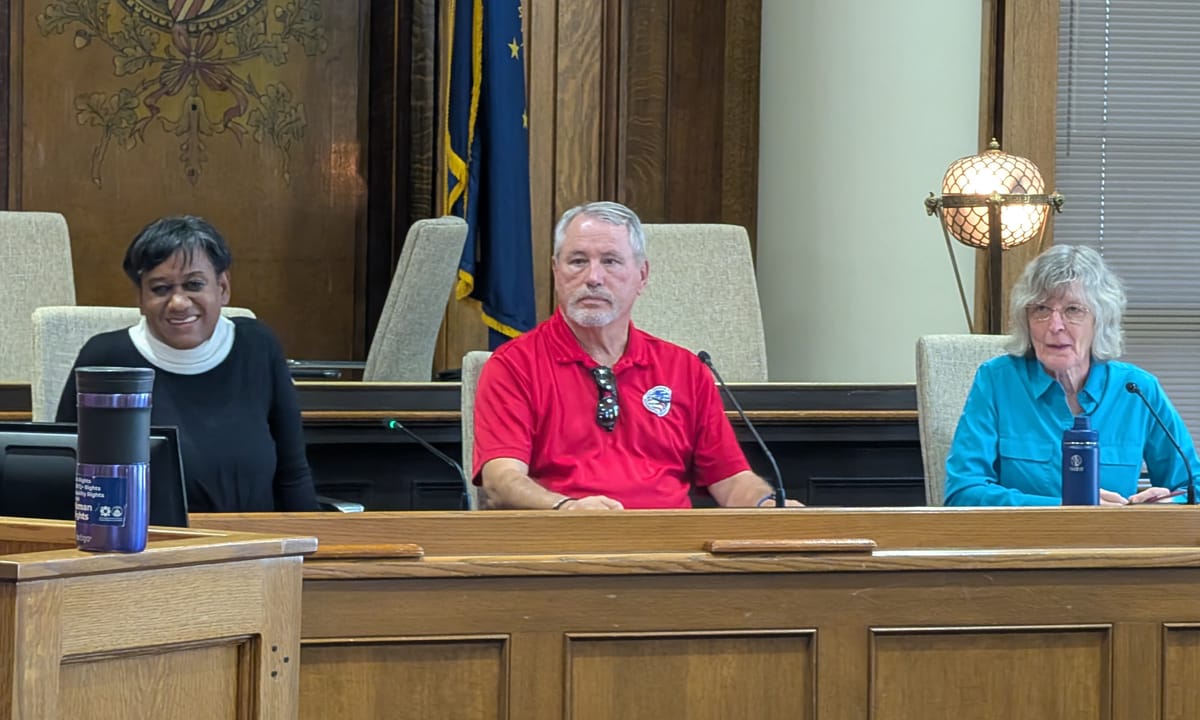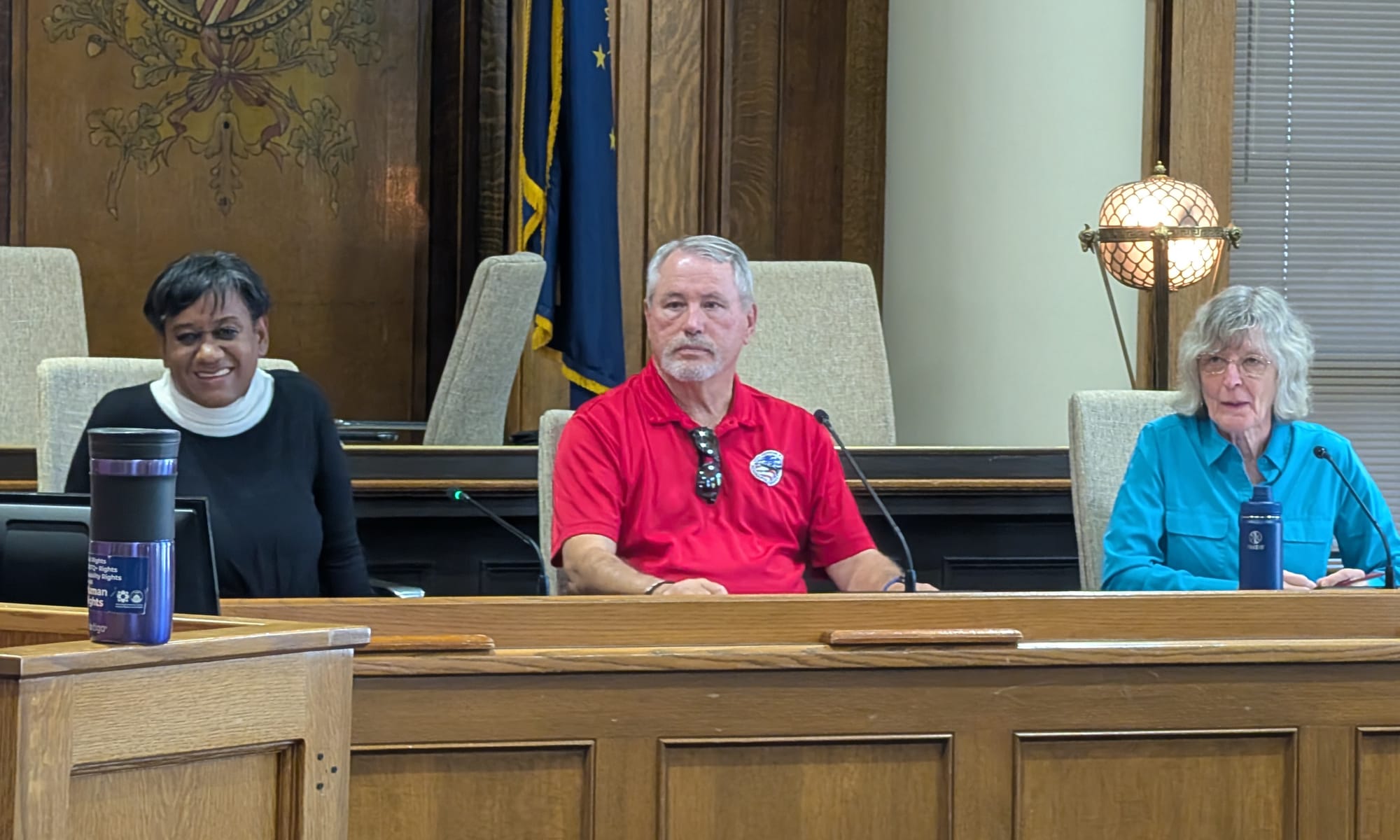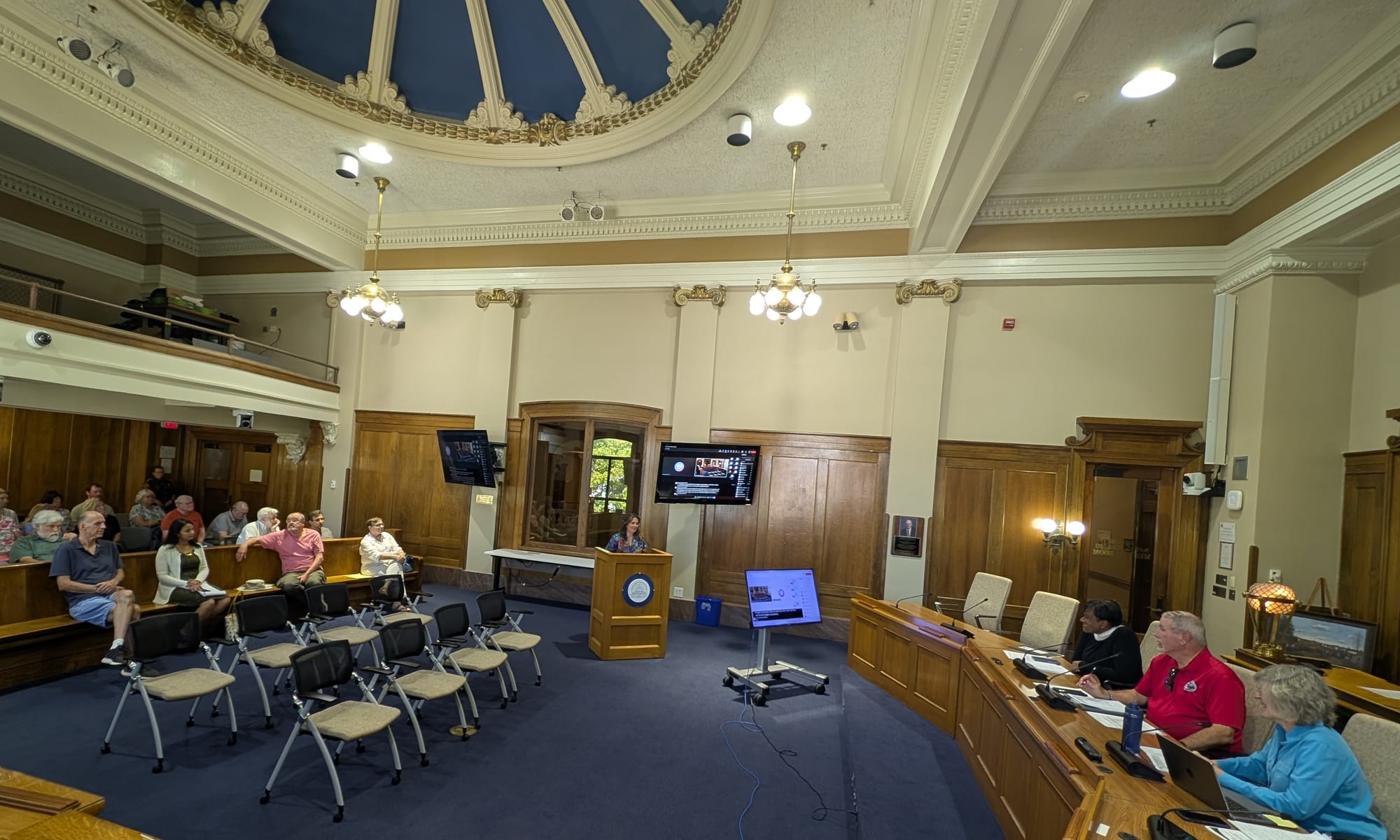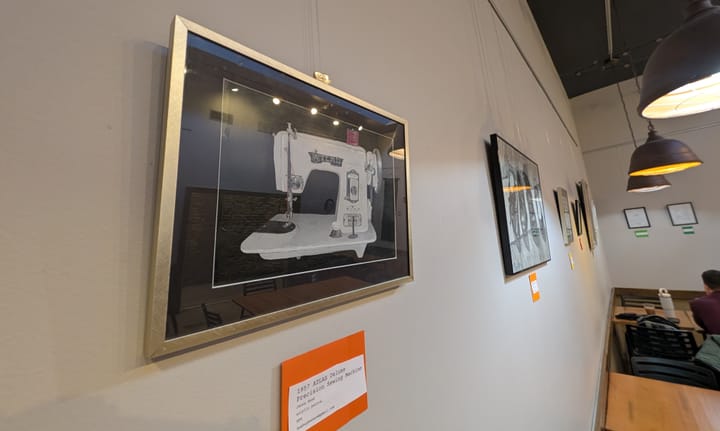Cross-party split makes Republican chair of Monroe County election board
Split votes on the three-member Monroe County election board are rare. But on Thursday, the board logged two split votes, both of which crossed party lines. One was on the board chairship. The other was on the 2026 budget.



Left: Monroe County’s election board from left—Nicole Browne, Danny Shields (chair), Penny Githens. Right: The election board listens to public comment at its Thursday meeting. (Dave Askins, Sept. 4, 2025)
Split votes on the three-member Monroe County election board are rare. Up until Thursday’s board meeting, the one discordant tally in recent memory was the party-line vote on vote centers, which was taken in mid-May this year.
But on Thursday, the board logged two split votes, both of which crossed party lines.
A Democrat, Nicole Browne serves on the election board under state law as Monroe County’s elected county clerk. Browne joined Republican Party appointee Danny Shields in his bid to be elected chair of the board, leaving Democratic Party appointee Penny Githens as the vote of dissent.
At Thursday’s meeting, Browne and Shields also voted to approve the clerk’s proposed 2026 election budget, over dissent from Githens.
It was Shields who had been the vote of dissent on the question of vote centers, which was enough to cause the implementation of vote centers in Monroe County to fail. Adoption would have required a unanimous vote.
Chairship of the board
Since 2017, the Monroe County election board has rotated the appointees from the Republican Party and Democratic Party through the chairship in a pattern that gave each appointee the gavel for one or two years in a systematic way. It was meant to ensure that representatives of each party had a turn chairing the board during presidential elections.
But a change in state law effectively sets the term of the election board chair at four years—keying the end of the chair’s term to Jan. 1 following the election of the circuit court clerk.
On Thursday, Githens stated her view that the chair should be a Democrat, saying, “I feel that because the voters in Monroe County elected a Democratic clerk—that it should a Democratic clerk and a Democratic board member—that through the end of 2026 that the chair should be in the Democrats’ hands …”
Shields pointed to the board’s past rotation, which slated 2025 and 2026 as years for the Republican appointee to serve as chair. He nominated himself as chair, and Browne voted for him.
The office of county clerk is up for election in 2026. That means under state law, Shields will serve as chair of the election board at least through Jan. 1, 2027.
The cross party-line vote was probably not a complete surprise, given the history between Browne and Githens. In 2021 and 2022, when Githens was serving on the board of county commissioners, she and her colleagues, Lee Jones and Julie Thomas, were in a protracted conflict with the county clerk over space allocations for the election division.
A measure of the acrimony between the commissioners and the clerk is reflected in remarks delivered by the clerk at a late 2021 election board meeting: “You may read it differently than I but, as I read through the thread, I find the Commissioners to have responded with revisionist history and outright lies.” Also a part of the clerk’s remarks was the statement: “My takeaway was that there was nothing but obfuscation on the part of the Board [of county commissioners.]”
At the immediately following board of commissioners meeting, Githens led off some remarks by saying, “To hear ourselves and to hear people in our office called liars and obfuscators is very disrespectful.”
Clerk’s proposed 2026 election budget
The election board’s discussion of the proposed 2026 election budget was foreshadowed last week at the Aug. 27 county council departmental budget hearings. Participating in the hearing from a remote connection, Githens said she could not support the clerk’s proposed election budget, because she still had questions about it. “I think it’s more appropriate in an election board meeting,” Githens said.
At that hearing, the county council took its preliminary vote supporting the clerk’s proposed budget. But Githens’s remarks teed up the discussion for Thursday’s election board meeting.
Poll workers were sent an email message the previous day by election staff saying that Monroe County clerk Nicole Browne “is requesting your presence” at the Thursday’s election board meeting. The email warns that a possible topic of discussion would be “potential reductions in poll workers’ pay.”
The Nat U. Hill Room at the historic Monroe County courthouse, where the election board meets, was packed with poll workers. The idea of reducing poll worker pay did not, in fact, get debated at Thursday’s board meeting.
From the public mic, a couple of poll workers defended the Election Day pay that Monroe County poll workers receive: $200 for inspectors; $175 for judges; $150 for clerks; and $120 for sheriffs. (A poll worker sheriff is not a sworn law enforcement officer.) Those amounts were determined last year, and there was not proposal to increase or reduce the pay rate for the 2026 elections. Browne told her board colleagues that Hamilton County poll workers make $400 for the day’s work.
Towards the end of Thursday’s meeting, Githens stressed that she was not disputing how much people were paid. Rather, she was questioning why the budget was more than what was required to pay them, Githens said.
At Thursday’s board meeting Githens scrutinized some line items of the proposed 2026 budget, including $35,000 allocated for each of two part-time positions in the clerk’s office. Githens calculated that even at the higher end of the pay scale, “if they are earning $20 an hour, that would still work out to about $31,200,” indicating the budgeted amount was higher than necessary.
Browne responded that the higher figure allows for flexibility, especially during busy election periods, and noted that any unspent funds revert to the election budget for future use. “I have allowed for a little bit of wiggle room,” Browne said.
Another item drawing scrutiny was a $500 line labeled “uniforms” for staff T-shirts. Githens questioned the necessity and cost. Election supervisor Kylie Farris said that the shirts—which are embroidered and cost about $180 for six with a discount—help staff and poll workers quickly identify election officials during busy periods. The people who can answer questions are easy to spot, Farris said.
“It is so much easier, so much quicker and more efficient to just have the T-shirts that stand out from everybody else,” Farris said. The kind of scenario that Farris described was a room where there are 80 election workers processing mailed-in absentee ballots.
Farris said last year 80 workers were required and they started at 6 a.m. and worked until almost 6 p.m. to open nearly 31,000 ballots. The ballots have to be unfolded, she said, to ensure that they feed smoothly through the scanners. About the budgeting for that task, Farris said, “That’s one thing that I will stand by.”
When Shields called for a vote on the proposed 2026 budget, he supported it, along with Browne. Githens dissented.
It's the county council that will be taking the final vote on the overall 2026 budget, which is currently set for a first reading on Sept. 30.




Comments ()